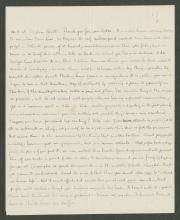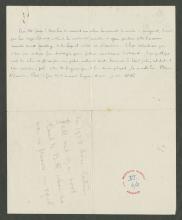BRACERS Record Detail for 116694
To access the original letter, email the Russell Archives.
This letter never reached Brett in 1918. According to a note on the letter by Elizabeth Trevelyan, it fell out of a book in 1923, one that had been lent to BR when he was in prison. Elizabeth Trevelyan is identified as the writer of the note in document .047686, record 75046. The letter mainly concerns Brett's deafness.
There are two typed transcriptions of this letter:
Document .047685, record 75045
Document .047686, record 75046
There is also a handwritten transcription:
Rec. Acq. 284, record 55538.
Letter 88
BR TO DOROTHY BRETT, 30 AUG. 1918
BRACERS 116694. ALS. McMaster. Auto. 2: 92–3
Previous Brixton letter, BRACERS 19354; next letter, BRACERS 18690
Edited by K. Blackwell, A. Bone, N. Griffin and S. Turcon
<Brixton Prison>1
30.8.18.
My dear Brett
Thank you for your letter.2 It is a kindness writing letters to me when I am here, as they are the only unhampered contact I can have with other people. I think prison, if it lasted, would be worse than your fate,3 but as mine is so brief it is nothing like as bad as what you have to endure. I do realize how terrible it is. But I believe there are things you could do that would make it less trying, small things mostly. To begin with a big thing: practise the mental discipline of not thinking how great a misfortune it is; when your mind begins to run in that direction, stop it violently by reciting a poem to yourself or thinking of the multiplication-table or some such plan. For smaller things: try, as far as possible, not to sit about with people who are having a general conversation; get in a corner with a tête-à-tête; make yourself interesting in the first place by being interested in whoever you are talking with, until things become easy and natural. I suppose you have practised lip-reading? Take care of your inner attitude to people: let it not be satirical or aloof, set yourself to try and get inside their skins and feel the passions that move them and the seriousness of things that matter to them. Don’t judge people morally: however just one’s judgment, that is a barren attitude. Most people have a key, fairly simple; if you find it, you can unlock their hearts. Your deafness need not prevent this, if you make a point of tête-à-tête. It has always seemed to me fearfully trying for you at Garsington to spend so much time in the middle of talk and laughter that you cannot understand. Don’t do more of that than you must. You can be “included in human life”. But it wants effort, and it wants that you should give something that people will value. Though your deafness may make that harder, it doesn’t make it impossible. Please don’t think all this very impertinent. I have only written it because I can’t bear to think how you suffer.
Poor Mr. Green!4 Tell him to consult me when he wants to make a conquest; I will give him sage advice, which he evidently needs. — Your picture of the 3 women5 sounds most exciting. I do hope it will be glorious. I hope I shall see you when you return from destroying your fellow-creatures in Scotland.6 I sympathize with the Chinese philosopher7 who fished without bait, because he liked fishing but did not like catching fish. When the Emperor found him so employed, he made him Prime Minister. But I fear that won’t happen to me.
Yrs
B.R.
- 1
[document] The letter was edited from the initialled, twice-folded original in BR’s handwriting in the Russell Archives. The bottom two thirds of the verso was left blank for privacy when the sheet was folded. In a blank area there is a pencil note in Elizabeth Trevelyan’s hand: “In 1923 these letters fell out of a book lent to B.R. when he was in prison in 1918”, and then she mislaid them. She returned the letters in 1956 (BR’s letter of 3 Dec. 1956; BRACERS 52871). By “these letters” she meant the present letter and Letter 89. He thought the camouflage book in question was Notre-Dame de Paris (see note 7 to Letter 102). The letter was published in BR’s Autobiography, 2: 92–3.
- 2
your letter Dated 26 August 1918 (BRACERS 75044).
- 3
your fate Her extreme deafness.
- 4
Poor Mr. Green! Brett’s lover, “a wounded machine-gunner — plain, but we think rich” (Brett to BR, BRACERS 75044), who was hurt and discouraged by her evident attraction to another invalided soldier, to whom she had been introduced by him.
- 5
picture of the 3 women Brett had described for BR in great detail an unfinished painting of “three women round a round table out in the garden. The table has a blue table cloth on it, and one figure in orange kneels in the foreground in front of the table, and the other two are sitting on a bench. And all three have large straw hats on their heads — great pale luminous hats. And one of the women is crochéing at a big striped blanket like Ottoline makes. All this with patterns of light and shade on the grass, and the big striped trunks of the Ilex tree behind.” It is not known whether she completed this picture. Although she was evidently pleased with it — “It may be wonderful”, she wrote — Brett’s letter to BR also mentioned that she had been painting over work with which she was dissatisfied and was “passing through a very difficult and unpleasant phase” as an artist (BRACERS 75044).
- 6
destroying your fellow-creatures in Scotland A reference to Brett’s upcoming fishing trip. BR’s closest encounter with sport fishing seems to have been in his 1959 “The Fisherman’s Nightmare or Magna est Veritas”, where he showed his acquaintance with Izaak Walton’s The Compleat Angler (1653). The angler of the nightmare (Fact and Fiction, p. 186) also preferred fishing in the Scottish Highlands, where Brett was heading — presumably to the Perthshire estates of her father, Lord Esher.
- 7
Chinese philosopher Jiang Ziya (also known as Jiang Taigong, and by other names) flourished during the 11th century BC, during the Shang dynasty. He was actually a military strategist rather than a philosopher and served the last ruler of the Shang dynasty for many years before, tiring of corruption at court, he took himself into exile, became the most famous angler in Chinese history, and was discovered by King Wen of Zhou who made him prime minister. His stated reason for fishing without a hook was that the fish would come to him of their own free will when they were ready to be caught.


